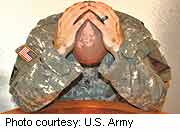
FRIDAY, May 22, 2015 (HealthDay News) — Anger often escalates quickly in veterans with post-traumatic stress disorder (PTSD) when they’re depressed, a new study reveals.
“Our study findings should draw attention to anger as a major treatment need when military service members screen positive for PTSD or for depression, and especially when they screen positive for both,” lead researcher Raymond Novaco said in a news release from the American Psychological Association.
PTSD is an anxiety disorder that develops after living through or witnessing a dangerous event. People with the disorder may feel intense stress, suffer from flashbacks or experience a “fight or flight” response when there’s no apparent danger.
In the study, Novaco’s team examined the mental-health records of almost 2,100 soldiers — mostly men — who served in Iraq and Afghanistan and later sought treatment.
Those who showed signs of depression and PTSD had higher levels of anger and believed they were more likely to hurt themselves, the researchers said. Almost three-quarters of those with signs of PTSD also appeared to suffer from depression.
“PTSD and depression dominate the landscape, but these, of course, are formal psychiatric disorders,” said Novaco, who is professor of psychology and social behavior at the University of California, Irvine.
“There is no diagnostic category for anger, nor do I think there should be, so anger slips from research attention,” he added.
Why worry about anger?
It’s not uncommon among veterans in general and can often be violent, according to Novaco. His team pointed to prior studies, including one of 18,000 soldiers returning from Iraq that found that 40 percent experienced anger outbursts, more than 30 percent uttered violent threats to others, and 15 percent engaged in physical fighting.
However, while anger “is a driver of violent behavior,” it is also amenable to focused psychological treatment, Novaco said.
The study was published this month in Psychological Trauma: Theory Research, Practice and Policy.
More information
To find out more about PTSD, head to the U.S. Department of Veterans Affairs.
Copyright © 2026 HealthDay. All rights reserved.

